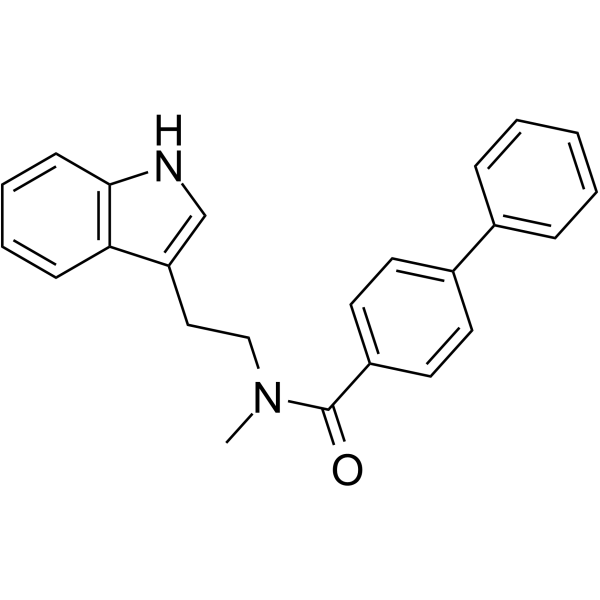CA-224
Modify Date: 2025-09-12 09:47:39

CA-224 structure
|
Common Name | CA-224 | ||
|---|---|---|---|---|
| CAS Number | 883561-04-4 | Molecular Weight | N/A | |
| Density | N/A | Boiling Point | N/A | |
| Molecular Formula | N/A | Melting Point | N/A | |
| MSDS | N/A | Flash Point | N/A | |
Use of CA-224CA224 (Compound 1) is a selective and orally active Cdk4–cyclin D1 inhibitor with an IC50 of 6.2 µM. CA224 induces cell apoptosis and shows antitumor activity[1]. |
| Name | CA-224 |
|---|
| Description | CA224 (Compound 1) is a selective and orally active Cdk4–cyclin D1 inhibitor with an IC50 of 6.2 µM. CA224 induces cell apoptosis and shows antitumor activity[1]. |
|---|---|
| Related Catalog | |
| Target |
cdk4-cyclin D1:6.2 μM (IC50) cdk2-cyclin A:521 μM (IC50) |
| In Vitro | CA224 (Compound 1) (48 h) shows antiproliferation activity against human cancer cell lines[1]. CA224 (18-48 h) blocks the growth of cancer cells at G0/G1 and G2/M phase of the cell cycle, and selectively kills SV40 large T-antigen transformed normal mouse embryonic liver cells (BNL SV A.8)[1][2]. CA224 (0-4 µM, 30 min) inhibits tubulin polymerization and enhances the depolymerization of stabilized tubulin protein[1]. CA224 (0-72 h) induces cell apoptosis in cancer cells[1]. CA224 (10 μM) shows 50%, 14%, 51% and 19% inhibition of CYP3A4, CYP2D6, CYP2C9, and CYP2C19, respectively[1]. Cell Proliferation Assay[1] Cell Line: LS174T, PC-3, MiaPaCa, A549, Calu-1, NCI-H460, NCI-H1299, NCI-H358, BNL CL2 and BNL SV A.8 Concentration: Incubation Time: 48 h Result: Showed antiproliferation activity with IC50 values of 3.5, 6.2, 4.0, 3.5, 11.5, 2.0, 2.5, 2.2, 2.6 and 3.8 uM against LS174T, PC-3, MiaPaCa, A549, Calu-1, NCI-H460, NCI-H1299, NCI-H358, BNL CL2 and BNL SV A.8, respectively. Cell Cycle Analysis[1][2] Cell Line: A549, NCI-H1299, NCI-H358, BNL CL2, BNL SV A.8 and Calu-1 Concentration: IC50 concentration (IC70 for Calu-1) Incubation Time: 24 h for A549, NCI-H1299 and Calu-1, 18 h for NCI-H358, 48 h for BNL CL2 and BNL SV A.8 Result: Induced a profound block at G2/M in A549 and NCI-H1299 cells. Maintained nocodazole- and paclitaxel-induced G2/M block in NCI-H358 cells. Exhibited prominent G2/M arrest in BNL CL2 cells. 31% of cells were detected in sub-G1 phase (control: 0%) in BNL SV A.8 cells. Retained the G0/G1 block in serum-starved p53-null Calu-1 cells. Western Blot Analysis[1] Cell Line: A549 and LS174T Concentration: IC50 concentration; 1, 2, 3 and 4 µM for tubulin polymerization Incubation Time: 24 h; 30 min for tubulin polymerization in A549 cells Result: Induced p53, p21, and p27. Downregulated cyclin B1 and Cdk1. Inhibited tubulin polymerization in a dose-dependent manner and resulted in accumulation of unassembled tubulin in the supernatant. Apoptosis Analysis[1] Cell Line: A549, NCI-H460, NCI-H358, and NCI-H1299 Concentration: IC50 and IC70 concentration Incubation Time: 24, 48 and 72 h Result: Induces apoptotic cell death in a dose- and time-dependent manner. |
| In Vivo | CA224 (Compound 1) (100 mg/kg; i.p.; once a day for 9 days) shows significant tumor growth inhibition without obvious toxicity[1]. Animal Model: The severe combined immunodeficient (SCID) mouse, lacking both T and B immune cells. Male mice weighing 18−25 g, 6−8 weeks of age for subcutaneous injection of HCT-116, female mice weighing 15−24 g, 6−8 weeks of age for subcutaneous injection of NCI-H460[1] Dosage: 100 mg/kg Administration: Intraperitoneal injection, once a day for 9 consecutive days Result: Showed significant tumor growth inhibition in both HCT-116 and NCI-H460 tumor models without significant bodyweight loss. Animal Model: BALB/c mice[1] Dosage: 10 mg/kg (oral administration) or 1.0 mg/kg (intravenous injection) Administration: Oral or intravenous injection (Pharmacokinetics Analysis) Result: Pharmacokinetics parameters determined for CA224 after IV and PO administration[1]. Parameter IV (1 mg/kg) Oral (10 mg/kg) t1/2,β (h) 0.33 1.16 AUC0-t (ng·h/mL) 187 172 AUC0-∞ (ng·h/mL) 189 182 Cmax (ng/mL) 371 190 Vd (L/Kg) 2.52 nd Vdss (L/Kg) 1.76 nd CL (mL/min/kg) 88.3 nd Bioavailability - 9.6% Time points considered for t1/2,β calculation 0.5-2 h 1-4 h |
| References |
| InChIKey | CPKLVRIYXBROSG-UHFFFAOYSA-N |
|---|---|
| SMILES | CN(CCc1c[nH]c2ccccc12)C(=O)c1ccc(-c2ccccc2)cc1 |